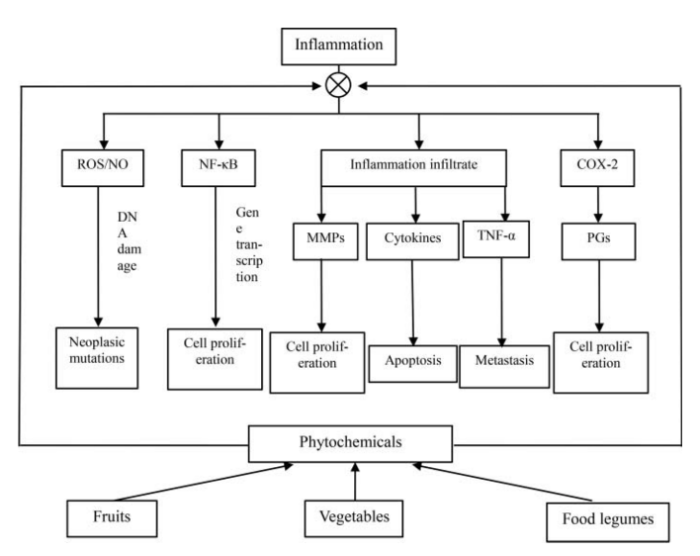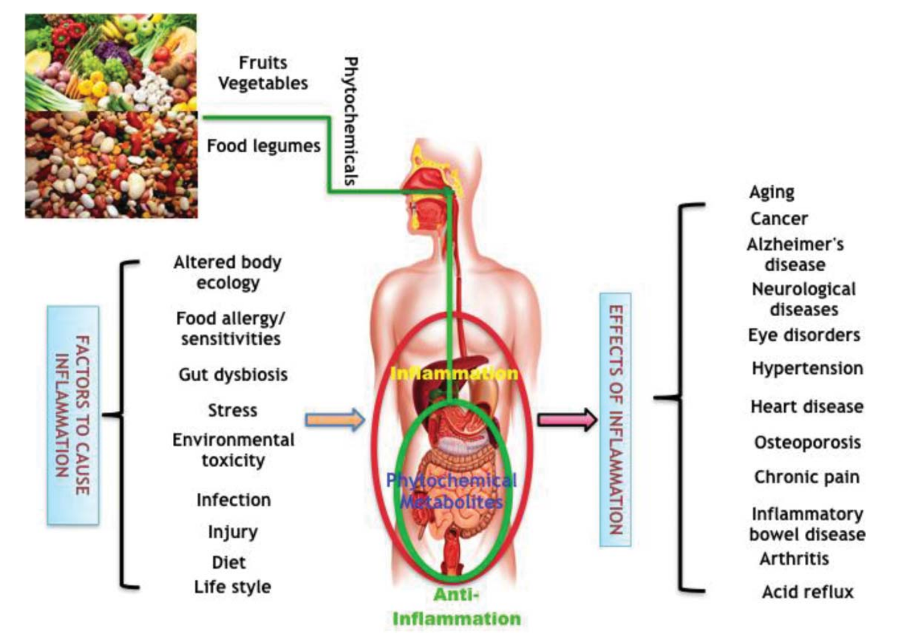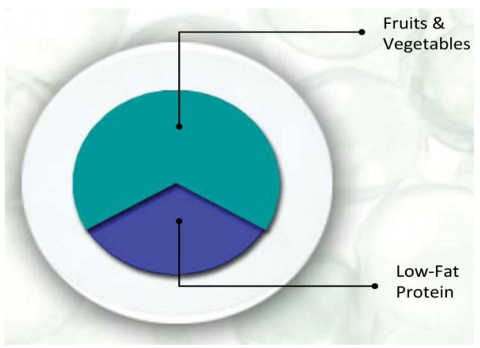Inflammation is the physiological response of the body to an infection or condition. But chronic inflammatory processes are involved in many health problems.
Chronic systemic inflammation is the leading cause of disability and mortality worldwide. Cancer, diabetes, cardiovascular, autoimmune, and neurodegenerative diseases are all related to inflammation. Experimental research has shown that food components may have adequate anti-inflammatory effects and could reduce the risk of disease.
Alejandro Monzó – Neolife Nutrition Unit
50% of all deaths are attributable to inflammation-related diseases
Inflammation is the immune system’s response to injury or infection. An inflammatory process begins when chemical compounds are released by the damaged tissue, and, in response, white blood cells produce substances that cause cells to divide and grow to rebuild the tissue and help repair the injury (1). Chronic inflammation often begins with a similar cellular response; however, it develops into a persistent state over a much longer period of time.
It may be caused by infections that do not go away, by abnormal immune reactions to tissues or by conditions such as obesity. Over time, oxidative stress resulting from inflammation may cause DNA damage and eventually lead to disease. Therefore, an anti-inflammatory diet consists of eating foods that prevent and reduce inflammation in our body (1,2).

Currently, our diet allows us to incorporate into our body foods with not only nutritional but also protective properties, like phytochemicals, capable of reducing the risk of developing various pathological conditions, including inflammatory-based diseases. Experts at Harvard Medical School point out that inflammation is an important underlying mechanism for the development of chronic diseases, such as type 2 diabetes and heart disease (3).
Among the factors that promote chronic inflammation, the current dietary profile of the general population stands out, characterized by a higher consumption of industrial foods, trans fats, salt, refined cereals, additives, and sugary drinks, together with a high consumption of alcohol and low consumption of fruits, vegetables and foods rich in dietary fiber (4,5). Decreasing the consumption of these pro-inflammatory foods and increasing the consumption of healthy, anti-inflammatory foods like fruits, and vegetables, especially leafy greens, may be effective in reducing these chronic diseases and associated mortality (4,5). This healthy diet should be accompanied by additional measures, such as avoiding smoking, alcohol, and chronic stress, combating overweight, and doing regular physical activity and exercise (2).

One of the long-term harmful elements of chronic inflammation is an acceleration of the oxidation processes of our cellular structures, which, in practice, is equivalent to accelerating their aging. The Spanish Society of Endocrinology and Nutrition (SEEN) points out the importance of respecting the nocturnal fasting period within the wake-sleep cycle to prevent oxidation (6). Within the normal biological cycle, the human being alternates between periods in which food is ingested and processed with periods of fasting in which metabolic pathways change and balance. If we’re always ingesting food, at night or throughout the day nonstop, the mechanisms of hormonal regulation of the metabolism are profoundly altered, since processing food means setting in motion the necessary oxidative processes. Therefore, the presence of antioxidant substances in certain foods can be a good defense strategy from a nutritional point of view.
Food thus becomes a factor in the modulation of the inflammatory response. Phytochemicals present in food, in their original form or when metabolized, can form active metabolites and behave as intracellular messengers activating or inhibiting the expression of genes involved in inflammatory processes. Therefore, one of the diets that has this characteristic is the Mediterranean diet, rich in fruits, vegetables, legumes, whole grains, fish, nuts and healthy oils, which promotes the reduction of cardiovascular events, cancer, and chronic diseases (3,4,7).
An anti-inflammatory diet offers benefits to all age groups of the population, regardless of their health or physiological condition (8). It requires eating more fresh, seasonal foods and avoiding processed foods. The goal is to eat foods rich in vitamins, minerals, antioxidants, fiber and healthy fatty acids, especially omega-3, such as those presented below (3,5,7):
- Green leafy vegetables: spinach, kale, Swiss chard
- Cruciferous vegetables: broccoli, cabbage, cauliflower, Brussels sprouts
- Tomato
- Fruits: citrus fruits, red fruits, orange, apple, pomegranate, strawberries, grapes
- Beverages: tea and coffee
- Nuts and seeds: walnuts and almonds
- Oily fish: salmon, tuna, sardines, mackerel
- Legumes
- Olive oil
- Dark chocolate
- Spices and plants: turmeric, ginger, cinnamon
In particular, fruits and vegetables like blueberries, apples, and leafy greens have natural antioxidants and polyphenols, protective compounds with great benefits. Studies have also associated nuts in particular with reduced markers of inflammation and a lower risk of cardiovascular disease and diabetes. Coffee and tea contain polyphenols and other anti-inflammatory compounds, which may also protect against inflammation (3).

Processed meats (hamburgers, sausages, cold cuts), potatoes and other fried foods, refined carbohydrates from pastries and cakes, sugary drinks, margarines and unhealthy and poor quality oils have been shown to be pro-inflammatory foods, whose consumption we should avoid and reduce due to their increased risk of chronic diseases such as cancer, especially colorectal cancer (4,5). Moreover, choosing less aggressive forms of cooking better preserves thermolabile elements (some vitamins and minerals) and generates fewer oxidative processes in the food, reducing the inflammatory load (6). Likewise, a study published in the Journal of Internal Medicine reported a link between following a diet with high anti-inflammatory potential and a longer life span and lower death rate from cardiovascular disease and cancer, with smokers particularly benefiting from the diet (5).
Therefore, current scientific evidence shows that eating a variety of nutritious foods can help reduce inflammation in the body. Our diet can help prevent and keep chronic inflammation under control, and especially a healthy eating pattern provides nutrients that support a healthy immune system. More studies are needed to draw conclusions about how these foods affect inflammation, and we still don’t know how much and how often “anti-inflammatory” foods should be consumed. For all these reasons, the Academy of Nutrition and Dietetics shows us dietary approaches that may help reduce inflammation (9):
- Increase the intake of vegetables and fruits, making sure they are at least half of what we eat, with great variety and color.
- Prioritize the consumption of quality proteins. Choose legumes, vegetable protein, lean cuts of meat, oily fish, and low-fat dairy products.
- Choose healthy fats, like extra virgin olive oil, nuts, avocado, canola oil, foods rich in omega 3, and seeds.
- Choose whole grains and legumes. This way, more dietary fiber is included in the diet, like brown rice, quinoa, millet…
- Experiment with fresh herbs and spices, adding flavor to dishes and recipes.
- Always take into account other lifestyle factors: getting enough sleep (both quality and duration of sleep have a direct impact on inflammation), staying active (30 to 60 minutes of moderate-intensity physical activity per day most days of the week has anti-inflammatory effects), and maintaining a healthy body weight (excess body fat may contribute to increased inflammation).
Finally, Neolife’s medical and nutrition team studies and analyzes the longitudinal monitoring of our patients analytical biomarkers on a regular basis, where inflammation is a key health metric. There is strong scientific evidence that suggests that eating and lifestyle habits play a part in our health and disease prevention. Changing our dietary pattern towards a healthier, more balanced and varied one, rich in antioxidants and phytochemicals, and displacing the consumption of unhealthy foods, may reduce the inflammatory load. It is in our hands to take the step towards adopting a healthy lifestyle, the key component to the success of our integral health program.
BIBLIOGRAPHY
(1) (2015). “Chronic inflammation”. National Cancer Institute. URL: https://www.cancer.gov/about-cancer/causes-prevention/risk/chronic-inflammation
(2) Zhu, F., Du, B. & Xu, B. (2018). “Anti-inflammatory effects of phytochemicals from fruits, vegetables and food legumes: A review”. Critical Reviews in Food Science and Nutrition. Vol. 58(8): 1260-1270. URL: https://pubmed.ncbi.nlm.nih.gov/28605204/
(3) Harvard Medical School. (2020). “Foods that fight inflammation”. Harvard Health Publishing. URL: https://www.health.harvard.edu/staying-healthy/foods-that-fight-inflammation
(4) De Luis Román, D.A. Bellido Guerrero, D. García Luna, P.P. Olivera Fuster, G. (2017). “Dietoterapia, nutrición clínica y metabolismo” [Diet therapy, clinical nutrition and metabolism]. Third Edition. Sociedad Española de Endocrinología y Nutrición. Grupo Aula Médica, S.L. Madrid, Spain.
(5) Parra-Soto, S. et al. (2020). “An anti-inflammatory diet is associated with lower mortality risk from all causes”. Letter to the editor. Rev Med Chile. Vol. 148: 1860-1867. URL: https://scielo.conicyt.cl/scielo.php?pid=S0034-98872020001201863&script=sci_arttext
(6) Botella, F. Dieta Antiinflamatoria [Anti-inflammatory Diet]. SEEN. URL: https://www.seen.es/ModulGEX/workspace/publico/modulos/web/docs/apartados/2268/050421_125415_2682718942.pdf
(7) Caballero-Gutiérrez, L. & Gonzáles, G. (2016). “Alimentos con efecto anti-inflamatorio” [Foods with anti-inflammatory effect]. Acta Médica Peruana. Vol. 33(1): 50-64. URL: https://www.scielo.org.pe/pdf/amp/v33n1/a09v33n1.pdf
(8) Barry Sears PhD. (2015). “Anti-inflammatory diets”. Journal of the American College of Nutrition. Vol. 34(1): 14-21. URL: https://pubmed.ncbi.nlm.nih.gov/26400429/
(9) Eat Right. (2019). “Can diet help with inflammation?”. Academy of Nutrition and Dietetics. URL: https://www.eatright.org/health/wellness/preventing-illness/can-diet-help-with-inflammation

